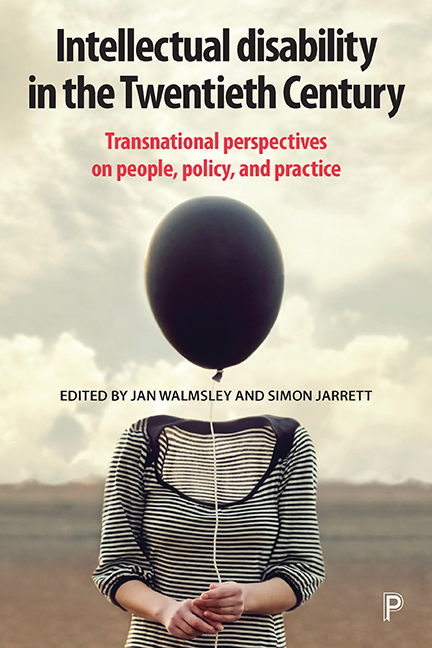 Intellectual Disability in the Twentieth Century
Intellectual Disability in the Twentieth Century Book contents
- Frontmatter
- Contents
- Notes on editors and contributors
- Introduction
- one Paradoxical lives: intellectual disability policy and practice in twentieth-century Australia
- two Tracing the historical and ideological roots of services for people with intellectual disabilities in Austria
- three Time of paradoxes: what the twentieth century was like for people with intellectual disabilities living in Czechoslovakia/Czech Republic
- four Intellectual disability in twentieth-century Ghana
- five A Greek Neverland: the history of the Leros asylums’ inmates with intellectual disability (1958–95)
- six Intellectual disability in Hong Kong: then and now
- seven People with intellectual disabilities in the European semi-periphery: the case of Hungary
- eight People with intellectual disabilities in Iceland in the twentieth century: sterilisation, social role valorisation and ‘normal life’
- nine Institutionalisation in twentieth-century New Zealand
- ten ‘My life in the institution’ and ‘My life in the community’: policies and practice in Taiwan
- eleven Intellectual disability policy and practice in twentieth-century United Kingdom
- twelve From social menace to unfulfilled promise: the evolution of policy and practice towards people with intellectual disabilities in the United States
- Index
six - Intellectual disability in Hong Kong: then and now
Published online by Cambridge University Press: 27 April 2022
- Frontmatter
- Contents
- Notes on editors and contributors
- Introduction
- one Paradoxical lives: intellectual disability policy and practice in twentieth-century Australia
- two Tracing the historical and ideological roots of services for people with intellectual disabilities in Austria
- three Time of paradoxes: what the twentieth century was like for people with intellectual disabilities living in Czechoslovakia/Czech Republic
- four Intellectual disability in twentieth-century Ghana
- five A Greek Neverland: the history of the Leros asylums’ inmates with intellectual disability (1958–95)
- six Intellectual disability in Hong Kong: then and now
- seven People with intellectual disabilities in the European semi-periphery: the case of Hungary
- eight People with intellectual disabilities in Iceland in the twentieth century: sterilisation, social role valorisation and ‘normal life’
- nine Institutionalisation in twentieth-century New Zealand
- ten ‘My life in the institution’ and ‘My life in the community’: policies and practice in Taiwan
- eleven Intellectual disability policy and practice in twentieth-century United Kingdom
- twelve From social menace to unfulfilled promise: the evolution of policy and practice towards people with intellectual disabilities in the United States
- Index
Summary
Introduction
This chapter explores policy and practice in Hong Kong, and their impact on people with intellectual disabilities and their families, in three phases: before the 1990s (‘Early developments’); pre- and post-resuming sovereignty over Hong Kong (‘The Golden Era’); and from the Millennium to the present (‘Divergence’).
Before the 1990s: Early developments
Laura's story I: A parent's experience
Laura, the mother of a 43-year-old daughter with Down's Syndrome, said:
“I still remember the moment, just after my labour, when I heard and learned from the dialogue among the medical staff in the delivery room that my daughter had Down's Syndrome; no one came up to me and informed me directly. I felt helpless and did not know where to seek help or get more information. Afterwards, no social worker came to me to give me any support or counselling. The hospital also did not follow up on my situation after we were discharged. I took some time to accept this news, and I had to seek information from other organisations on my own. The days were full of tears, as I recall.” (A scenario from the year 1974)
Laura's experience reflects the general situation of families with a child with intellectual disability in the early 1970s. This period marked the beginning of the development of disability services (then conceived of as ‘rehabilitation services’) in Hong Kong. From the 1970s to the 1990s, the field was in a developmental phase in ideology, policy direction, service provision and people's understanding.
Morninghill School was the first special school in Hong Kong for pupils with intellectual disability. It was established in 1964 by a group of parents. The school had one class, with four pupils: one each from the USA, Canada, Australia and Scotland. From 1968 the school was subsidised by the government and run by the Hong Kong Association for the Mentally Handicapped (now called Hong Chi Association) (Hong Chi Association, 2018). The enactment by the government of six-year compulsory education in 1971 and nine-year free and compulsory education in 1978 (Poon-McBrayer and Lian, 2002) gradually provided children with intellectual disability the opportunity of schooling.
- Type
- Chapter
- Information
- Intellectual Disability in the Twentieth CenturyTransnational Perspectives on People, Policy, and Practice, pp. 99 - 112Publisher: Bristol University PressPrint publication year: 2019
